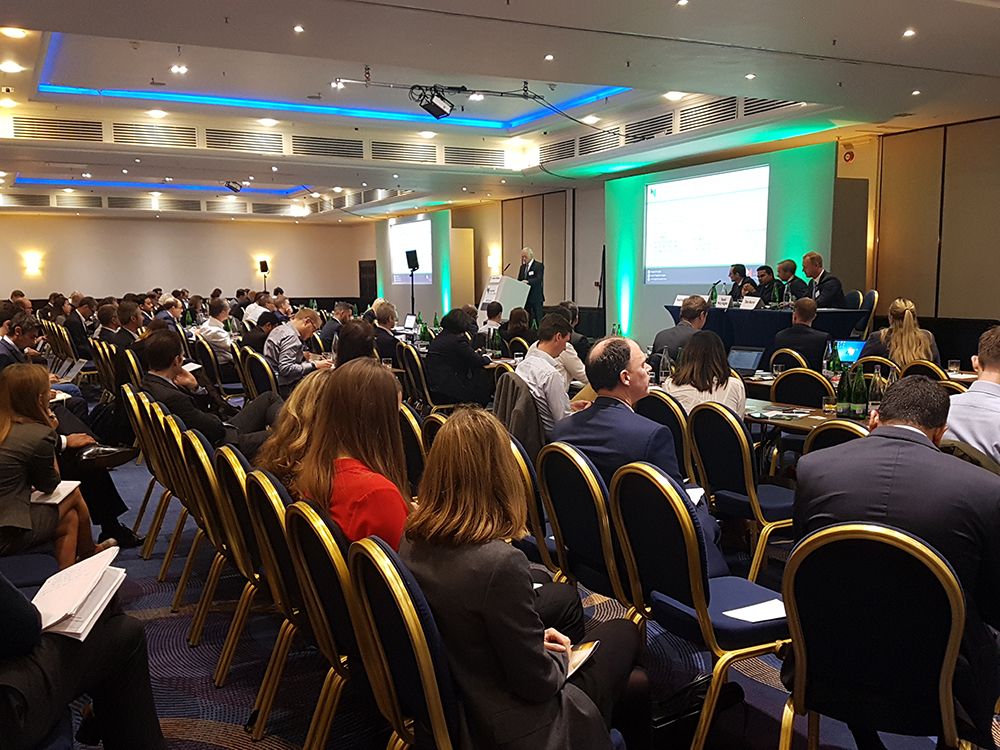
A-Team Group’s RegTech Summit returned to London last week with an impressive line-up of keynote speakers, lively panel discussions and an innovative regtech showcase featuring four newcomers to the market. The event also hosted numerous sponsors exhibiting leading regtech solutions and was joined by over 200 capital markets participants keen to further their knowledge of, and investment in, regtech.
Keynote presentations
Stephane Malrait, managing director of market structure and innovation in financial markets at ING, opened the Summit with a review of the regtech landscape and a call for financial institutions, solution providers and regulators to join forces to support regtech growth and innovation, and overcome barriers to adoption. He noted the problems faced by young regtech companies, including long sales cycles to large financial institutions, and the problems of large institutions, including the difficulty of identifying the best regtechs for their needs and pushing purchases of unknown quantities through traditional procurement processes.
Considering these issues, Malrait said cooperation across the industry is critical and described how ING is working to create a dynamic ecosystem that will enable better outcomes for all. To demonstrate the value of regtech, he cited five Cs covering clients, cost reduction and improved capital, control and compliance, saying solutions need at least two or three of these Cs to be viable.
A second keynote by Che Sidanius, global head of financial regulatory and industry affairs at Thomson Reuters, covered the future of fighting financial crime. Sidanius described the pressing problems presented by financial crime, including its growing impact and potential to destabilise the banking system, and discussed the extent of money laundering on a global basis, an increasing number of victims of modern slavery, and the limitations of technical tick box compliance.
To counter these issues, Sidanius proposed a global and coordinated response, based on shared information and technology, and taking into account conflicts between regulations such as anti-money laundering (AML) and General Data Protection Regulation (GDPR). To make a difference to the current state of financial crime, he said public and private organisations must work together and share data to reduce financial crime, pre-empt terrorist attacks and close down human trafficking.
Peter Moss, CEO of the SmartStream Reference Data Utility (RDU), dived into the detail of systematic internalisation under Markets in Financial Instruments Directive II (MiFID II) in a final keynote. He noted growing numbers of systematic internalisers (SIs) registered with the European Securities and Markets Authority (ESMA) since the SI regime became mandatory on September 1, 2018, the delay in SI rules covering OTC derivatives until March 1, 2019, and forecast numbers of SIs at around 150 mid next year.
Looking at the obligations of SIs, including determining counterparty status, pre-trade and post-trade transaction reporting, and setting up control frameworks, Moss said SI implementation at most Tier 1 banks is going well, while tactical approaches at other banks provide considerable opportunities for regtech vendors. In conclusion, he questioned the impact of Brexit on MiFID II and the SI regime.
Showcase
The Summit included a quick-fire showcase in which four regtech solutions presented their services in five minutes each and responded to audience questions. Shield Financial Compliance presented a compliance hub connecting trade and communications data; Exactpro software testing services; FinCom.co technology matching entries between databases using phonetics, artificial intelligence, fuzzy logic; and InsiderLog a web-based tool for compiling insider lists in compliance with Market Abuse Regulation (MAR).
Panel sessions
The RegTech Summit panel discussions were packed with useful information on selecting and implementing regtech solutions, identifying business use cases, finding a sustainable MiFID II solution and more!
Andrew Delaney, chief content officer at A-Team Group, moderated the first panel on overcoming barriers and enabling regtech. He was joined by leading regtech users who discussed their approaches to regtech, how to evaluate vendors and products that are not well proven, and how to win management buy-in.
A panel on best practices for regulatory reporting efficiency, led by James Phillips, global head of regulatory strategy at Lombard Risk, detailed the challenges of upcoming regulations including Securities Financing Transactions Regulation (SFTR), AnaCredit and Fundamental Review of the Trading Book (FRTB). It also discussed the potential of distributed ledger technology as a solution for transaction reporting, although interoperability remains an issue. A later regulatory panel on building sustainable MiFID II compliance followed Moss’s lead and noted openings for regtech.
Considering regtech use cases, further panel discussions covered improving AML and Know Your Customer (KYC), the evolution of trade surveillance, and creating a regulatory change management framework to navigate risk and manage change.
With the keynote, showcase and panel sessions complete, the Summit sponsors, delegates and speakers enjoyed a networking drinks reception hosted by A-Team Group.
If you would like to catch up with the latest opinions and guidance on regtech, blogs and podcasts covering some of the sessions at the London RegTech Summit will be available soon. To make sure your secure a place at our next RegTech Summit, which will be in New York City on November 15, 2018, register now.
Subscribe to our newsletter





